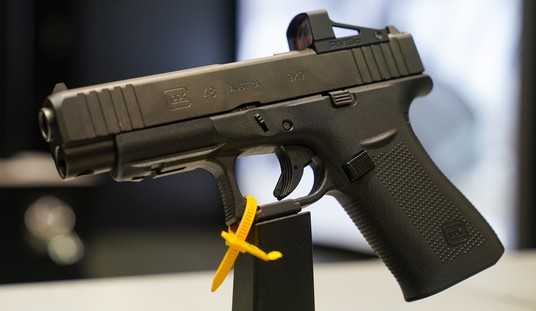We now know that the man who murdered two women and wounded nine others before committing suicide in a Lafayette, Louisiana movie theater acquired his .40 Smith and Wesson Hi-Point handgun at a gun shop in neighboring Alabama.
Polly Mosendz of Newsweek was one of those attempting to claim that the murderer* bought his gun legally.
The gunman, J___ R______ H_____, turned the gun on himself after the mass shooting. Despite a history of mental illness and crime, H_____ was able to purchase the handgun he used in the shooting legally in the state of Alabama. His criminal record included charges of arson, domestic violence and stalking, and thus gun control activists argue H_____ should not have had access to a gun. Indeed, his wife once hid H_____’s guns.
“Legally” must mean something different at Newsweek than it does in the rest of the world, where the murderer clearly committed a felony when he lied in his ATF form 4473.

Have you ever been committed to a mental institution?
The murderer lied in answering this question, which is a federal crime.
He was committed involuntarily to a mental institution in 2008, as the Associated Press notes.
Court records reviewed by The Associated Press strongly suggest H_____ should have been reported to the state and federal databases used to keep people with serious mental illnesses from buying firearms, legal experts said.
“It sure does seem like something failed,” said Judge Susan Tate, who presides over a probate court in Athens, Georgia, and has studied issues relating to weapons and the mentally ill. “I have no idea how he was able to get a firearm.”
H_____ never should have been able to buy a gun, said Sheriff Heath Taylor in Russell County, Alabama, whose office denied him a concealed weapons permit in 2006 based on arson and domestic violence allegations, even though the victims declined to pursue charges.
H_____ racked up plenty of complaints, but no evidence has surfaced of any criminal conviction that would have kept him from passing the background check required for many gun purchases. Federal law does generally prohibit the purchase or possession of a firearm by anyone who has ever been involuntarily committed for mental health treatment.
That’s what happened to H_____ in 2008 after his family accused him of threatening behavior, warning authorities that he had a history of bipolar disorder and was making ominous statements. His wife removed his guns and together, the family persuaded a judge to issue a protective order keeping him away once he left the hospital.
At that point, court officials should have reported H_____’s involuntary mental commitment to the Georgia database that feeds the FBI’s background check system, which provides for a delay of up to three days when records suggest a buyer may be ineligible.
The murderer was able to get his gun from an Alabama pawn shop, not through any fault of the pawn shop, nor from loopholes in the law, but because Georgia did not provide accurate data to the federal government.
Similar reporting issues are part of the reason why the white supremacist who shot up Emanuel A.M.E. Zion Church in Charleston, S.C., did not show up immediately as a prohibited person after confessing to have illegal narcotics (though the Department of Justice has still failed to explain why the FBI’s NICS system didn’t alert the ATF in South Carolina to retrieve the handgun in the 62 days before he used it).
If we really want to shore up any deficiencies or inefficiencies in the NICS background check system, we should clearly be focused on creating systems and allocating resources at the local and state level to ensure that the necessary information is uploaded accurately, completely, in a timely manner.
Or does that make too much sense?
* Bearing Arms does not publish the names of mass or spree shooters.








Join the conversation as a VIP Member